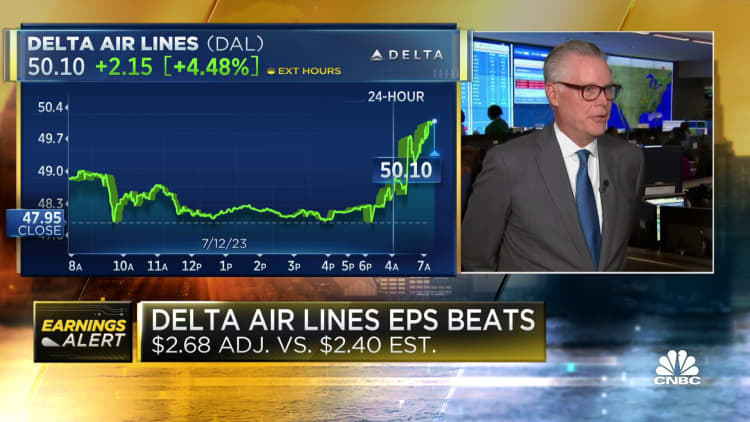
Delta Air Lines posted its highest quarterly revenue and earnings ever thanks to scorching travel demand that has defied fears of an economic slowdown for months.
International travel and demand for premium seats like first class were standouts during the second quarter, while a 22% drop in Delta’s fuel costs boosted the carrier’s bottom line.
The Atlanta-based airline on Thursday hiked its 2023 earnings forecast to an adjusted $6 to $7 a share, up from its estimate last month at the high end of a $5 to $6 per share range.
CEO Ed Bastian said he expects consumers’ desire for travel will fuel bookings for years, calling the current period the “mid-innings” of travel growth.
“I think the trends that we’ve seen this year are going to continue,” he said in an interview.
Nurphoto | Nurphoto | Getty Images
Bastian said international demand remains robust into the fall and he expects a slow but steady increase in corporate travel bookings.
Delta is the first of the U.S. airlines to post second-quarter results, and its report sets an upbeat tone for the rest of the year. United Airlines and American Airlines are scheduled to report next week.
In the third quarter, Delta expects to earn $2.20 to $2.50 a share, above analysts’ expectations, on a 16% increase in capacity. The carrier forecast a jump in revenue of as much as 14% from a year earlier.
Here’s how Delta performed in the quarter ended June 30 compared with Wall Street expectations based on Refinitiv consensus estimates:
- Adjusted earnings per share: $2.68 cents vs. $2.40 expected.
- Adjusted Revenue: $14.61 billion vs. $14.49 billion expected.
Trans-Atlantic travel was particularly strong in the spring and early summer, with revenue from those trips up more than 60% from a year ago, compared with an 8% increase in domestic revenue and 21% rise in passenger revenue overall. Delta and its rivals have ramped up capacity to Europe this year in anticipation of the resurgence. (Bastian told CNBC he recently traveled to the south of France.)
Premium ticket revenue growth also outpaced that of main cabin economy.
Unit revenues, a measure of how much airlines are generating for every seat they fly a mile, rose 1% year over year, and a 17% rise in capacity.
“If you were to ask any quarter in which we grew capacity by high double digits and we held our overall pricing, that would be pretty amazing,” Bastian said.
Overall, fares dropped nearly 19% in the U.S. last month from a year ago and 8% from May, as airlines ramped up service for the peak travel season, according to the latest inflation read.
Bastian said that capacity constraints and strong demand drove fares high last year but that “we’re in a normalized environment today.” and that Delta’s pricing is still holding up.
Delta’s net income for the quarter was $1.83 billion, or $2.84 a share, up from $735 million, or $1.15 a share, a year ago. Adjusting for certain items, per-share earnings were $2.68, up from $1.44 in the same period last year.
The airline’s net income was the highest since the fourth quarter of 2013, when the airline put more than $8 billion in tax-loss credits back on its balance sheet.
Delta brought in $14.61 billion in revenue, adjusted to strip out sales from its refinery, in the three months ended June 30, up 19% from a year ago, and above analysts estimates. Total revenue of $15.58 billion was up 13% from a year earlier.



